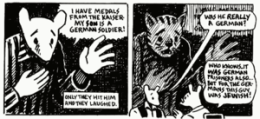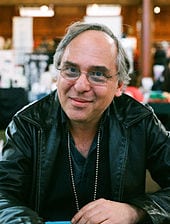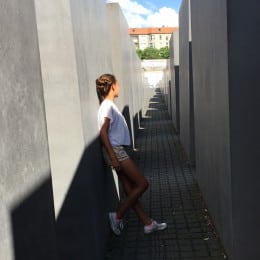 There are some advantages to being a mom and writer for young readers. If you have teenagers like I do, you might find yourself reading the same books that your kids are reading. Sometimes they might even become your go-to-reading-list-source. That’s how I discovered MAUS: A SURVIVOR’S TALE. My oldest daughter selected it to read from a list of Holocaust related books for an English assignment.
There are some advantages to being a mom and writer for young readers. If you have teenagers like I do, you might find yourself reading the same books that your kids are reading. Sometimes they might even become your go-to-reading-list-source. That’s how I discovered MAUS: A SURVIVOR’S TALE. My oldest daughter selected it to read from a list of Holocaust related books for an English assignment.
 In short, MAUS is a graphic novel by American cartoonist Art Spiegelman. More specifically, it’s an interview between Spiegelman and his father, Vladek, about his experience as a Polish Jew and Holocaust survivor. When it comes to genre, MAUS wears a lot of hats. MAUS is a memoir, a biography, fiction, history, and an autobiography. Spiegelman’s choice to depict his cast of characters and their respective race by a different animal is brilliant. Can you guess from the cover which animal depicts the Jews? And the Germans?
In short, MAUS is a graphic novel by American cartoonist Art Spiegelman. More specifically, it’s an interview between Spiegelman and his father, Vladek, about his experience as a Polish Jew and Holocaust survivor. When it comes to genre, MAUS wears a lot of hats. MAUS is a memoir, a biography, fiction, history, and an autobiography. Spiegelman’s choice to depict his cast of characters and their respective race by a different animal is brilliant. Can you guess from the cover which animal depicts the Jews? And the Germans?
 MAUS is also the first graphic novel to win a Pulitzer Prize. That’s why I snatched it from my daughter’s desk and read it in one sitting. Spiegelman captures his father’s story in such a realistic way giving readers the kind of details writers appreciate. I felt like I was planted at the Spiegelman family table in New York during the interview process gaining insight on the Jewish experience through the eyes of a survivor.
MAUS is also the first graphic novel to win a Pulitzer Prize. That’s why I snatched it from my daughter’s desk and read it in one sitting. Spiegelman captures his father’s story in such a realistic way giving readers the kind of details writers appreciate. I felt like I was planted at the Spiegelman family table in New York during the interview process gaining insight on the Jewish experience through the eyes of a survivor.
I give MAUS a big thumbs up and am pleased to see it included on my daughter’s school reading list.
For more information about Art Spiegelman and the making of MAUS, click here.
 Given the subject matter of MAUS, I’m eager to find out what my daughter understands and what kind of questions she asks me after reading it. It’s not like I sit her down to watch documentaries on Hitler like my father did when I was her age. Even so, despite my dad’s frame-by-frame commentary of what Hitler had done, my dad still couldn’t make me understand why anyone would want to eliminate an entire race of people. It just didn’t make any sense to me then or now. So I’m even more eager to learn which writing prompt my daughter selects for her English writing assignment and what she says in it.
Given the subject matter of MAUS, I’m eager to find out what my daughter understands and what kind of questions she asks me after reading it. It’s not like I sit her down to watch documentaries on Hitler like my father did when I was her age. Even so, despite my dad’s frame-by-frame commentary of what Hitler had done, my dad still couldn’t make me understand why anyone would want to eliminate an entire race of people. It just didn’t make any sense to me then or now. So I’m even more eager to learn which writing prompt my daughter selects for her English writing assignment and what she says in it.
Update: Aubrey selected Writing Prompt #6. Write a letter to one of the characters or the author of the book. Give your reactions to specific events that took place, ask logical questions, etc. (1 page).
Drum roll please …
September 19, 2015
Dear Mr. Spiegelman,
Hi, my name is Aubrey Turner. I’m an eighth-grade student at Piedmont Middle School, which is located in Piedmont, California near San Francisco. I just read MAUS, the book about your father and am amazed that he survived all that he did. For example, when he lived in the prisoner of war camp and had to “move mountains” when he wasn’t used to doing manual labor. So many more terrible things happened to your father and his Jewish friends that I have a hard time understanding why. On more pages than I care to admit I had to ask my mom a question. And still I really don’t understand. For example, why did the Germans hang those four Jewish people and leave them there for a week?
And why were there coupons? And what was the big deal that they had to die because of them?
And why did Tosha have to poison your older brother? That was so sad.
Why did your mom give up on her life and commit suicide after all that she went through to live? That doesn’t make sense to me either.
At first I didn’t understand what pages 5 and 6 about friends had to do with the Holocaust or even why the non-Jewish Poles were depicted as pigs. But when I got to the end I see that your father really learned the hard way who he could trust and who were his real friends. So many non-Jewish Poles promised to help the Jewish people, took their money, and then turned them in to the Germans afterward. I can see why you made these people into pigs, but what about the non-Jewish Poles who helped your father and mother hide? Why were they pigs? They seemed more like a very protective Great Dane to me.
Any why did your father marry Mala? He doesn’t seem happy with her. And she doesn’t seem happy with him.
And why did your father burn your mother’s journals. She wanted you to read them and it was the only thing left of her. I’d really like to hear her story. It’s too bad her journals are gone. I can understand why you called your dad a murderer because in a way your mom died all over again for you. But you only have your dad left and probably shouldn’t have called him such a bad name. His life was hard and maybe it was too painful for him to relive his life through your mother’s journals. Or maybe calling him a murderer is the fiction part of your story? To make your ending stronger?
 I’m glad you included a map of Poland on the back cover. The mouse and poison icons gave me a better idea of where the concentration camps were located. Since there was a camp near your father’s hometown of Sosnowiec, it’s really remarkable that your father didn’t get stuck there.
I’m glad you included a map of Poland on the back cover. The mouse and poison icons gave me a better idea of where the concentration camps were located. Since there was a camp near your father’s hometown of Sosnowiec, it’s really remarkable that your father didn’t get stuck there.
I can see why you chose to represent the Jewish people as mice and the Germans as cats. A mouse really doesn’t have a chance against a cat, unless it’s cunning or can find a hole to hide into which is what many Jewish survivors had to do to stay alive.
Congratulations on winning a Pulitzer Prize! Your mom would be proud of you!!!!!!!!
Good luck,
Aubrey
P.S. The photo of me above was taken this past summer in Berlin at the Holocaust Memorial. It also goes by a more appropriate sounding name: Memorial to the Murdered Jews of Europe.


